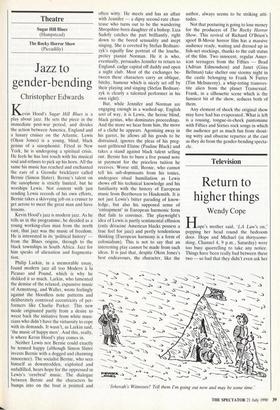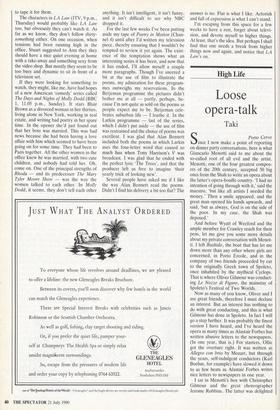Television
Return to higher things
Wendy Cope
Hope's mother said, 'LA Law's on,' popping her head round the bedroom door. Hope and Michael (in thirtysome- thing, Channel 4, 9 p.m., Saturday) were too busy quarrelling to take any notice. Things have been really bad between these two — so bad that they didn't even ask her 'Jehovah's Witnesses? Tell them I'm going out now and may be some time.' to tape it for them.
The characters in LA Law (ITV, 9 p.m., Thursday) would probably like LA Law too, but obviously they can't watch it. As far as we know, they don't follow thirty- something either. On one occasion, when tensions had been running high in the office, Stuart suggested to Ann they they should have a nice quiet evening at home with a take-away and something sexy from the video shop. But mostly they seem to be too busy and dynamic to sit in front of a television set.
If they were looking for something to watch, they might, like me, have had hopes of a new American 'comedy' series called The Days and Nights of Molly Dodd (BBC 1, 11.05 p.m., Sunday). It stars Blair Brown as a divorced woman in her thirties, living alone in New York, working in real estate, and writing bad poetry in her spare time. In the opener she'd just found out that her boss was married. This was bad news because she had been having a love affair with him which seemed to have been going on for some time. They had been to Paris together. All the other women in the office knew he was married, with two cute children, and nobody had told her. Oh, come on. One of the principal strengths of Rhoda — and its predecessor The Mary Tyler Moore Show — was the way the women talked to each other. In Molly Dodd, it seems, they don't tell each other anything. It isn't intelligent, it isn't funny, and it isn't difficult to see why NBC dropped it.
For the last few weeks I've been putting aside my tape of Poetry in Motion (Chan- nel 4) until after I'd written my television piece, thereby ensuring that I wouldn't be tempted to review it yet again. The exist- ence of the temptation shows what an interesting series it has been, and now that it has ended, I'll allow myself a couple more paragraphs. Though I've sneered a bit at the use of film to illustrate the poems, my admiration for these program- mes outweighs my reservations. In the Betjeman programme the pictures didn't bother me at all — partly, perhaps, be- cause I'm not quite as sold on the poems as people expect me to be. Betjeman cele- brates suburban life — I loathe it. In the Larkin programme — last of the series, which I didn't put aside — the use of film was restrained and the choice of poems was excellent. I was glad that Alan Bennett included both the poems in which Larkin uses the four-letter word that caused so much fuss when Tony Harrison's V was broadcast. I was glad that he ended with the perfect lyric 'The Trees', and that the producer left us free to imagine 'their yearly trick of looking new'.
Several people have asked me if I like the way Alan Bennett read the poems. Didn't I find his delivery a bit too flat? The answer is no. Flat is what I like. Actorish and full of expression is what I can't stand.
I'm escaping from this space for a few weeks to have a rest, forget about televi- sion, and devote myself to higher things. At least, that's the idea. But perhaps I shall find that one needs a break from higher things now and again, and notice that LA Law's on.



















































 Previous page
Previous page